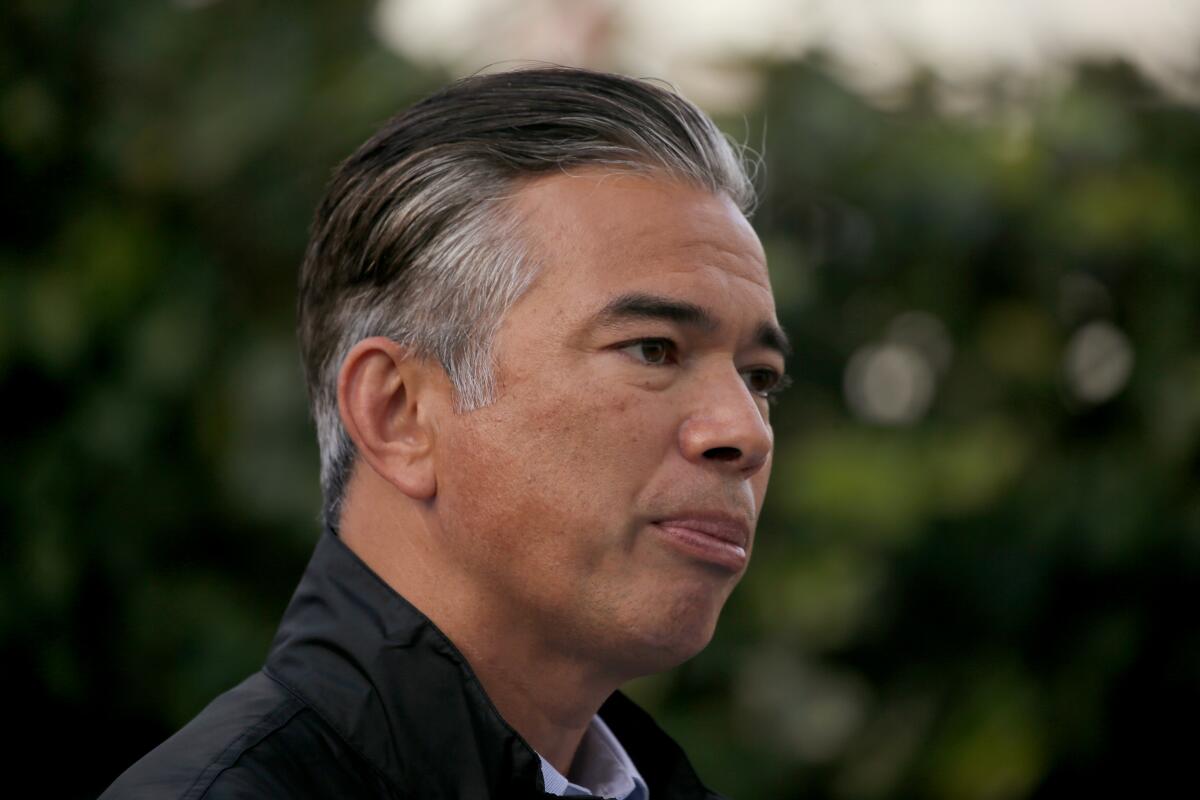Editorial: Ignore the early reviews. California’s criminal justice reform movement fared well on election day

- Share via
Despite what you may have heard, Tuesday was a fairly good day for criminal justice reform in California.
Of course, it may not seem so to Chesa Boudin, the soon-to-be-ex-San Francisco district attorney, who was recalled by a wide margin by the same impatient voters who ousted the previous D.A. two years ago.
And the right-wing forces trying to roll back criminal justice reform nationwide will have a different take. They targeted Boudin, a forward-looking progressive D.A., because his liberal jurisdiction and his personal story made him seem like the anti-reformers’ biggest trophy. They funneled enormous resources into the recall effort, and Boudin, who is at best a middling politician, did a poor job defending his record.
Boudin’s parents were convicted of felony murder of police officers, a fact that made him repugnant to the law enforcement establishment and a lightning rod for fearmongering. He was never the first choice of a majority of San Francisco voters, but defeated his predecessor in the city’s ranked-choice voting system.
Here are the L.A. Times’ editorial board endorsements for elected offices in Los Angeles city and county, LAUSD, superior court, statewide offices, the state legislature and U.S. House and Senate seats.
In other June 7 primary races around the state, though, many reform prosecutors and candidates did well. The most obvious and important example is California Atty. Gen. Rob Bonta, who so far has won more than half the vote in his five-person race. Sacramento County’s law-and-order Dist. Atty. Anne Marie Schubert, who often sounded as if she were leading a war against the entire progressive prosecutor movement, came in a distant fourth, with only 7.5% of the vote.
Her poor showing may spoil the strategy of the people pushing to roll back recent reforms: Put forward tough-on-crime candidates who are nonpartisan (Schubert was formerly a Republican but dropped her affiliation several years ago). Bonta will now face a Republican in the November general election in this overwhelmingly blue state. It’s not yet clear whether it will be Nathan Hochman or Eric Early. (Ballots are still being counted, and more continue to trickle into county election offices under new rules that allow a properly postmarked mail ballot to arrive up to a week after election day.)
In Contra Costa County, Dist. Atty. Diana Becton won reelection. The campaign of her opponent, Mary Knox, was based on the same nonsense spouted by other opponents of criminal justice reform — that so-called progressive policies that focus resources on the most serious and dangerous crimes are somehow responsible for increases in those very same crimes.
In Alameda County, civil rights attorney Pamela Price placed first and will be in a runoff against reform-oriented veteran prosecutor Terry Wiley. Santa Clara County Dist. Atty. Jeff Rosen, one of only two D.A.s who supported Proposition 47 from the start, won reelection. That modest 2014 ballot measure made drug possession a misdemeanor and raised the felony threshold for theft. The Make America Scared Again crowd likes to blame it for increases in crimes it did not affect, including murder and the “smash and grab” robberies that made national headlines during the holiday season last year.
District attorneys are elected one to a county, so the power of conservative politics and rural outlooks continues to hold inordinate sway in Sacramento.
Rosen is sometimes not embraced by “progressive prosecutors” as one of their number because he takes a more traditional tough-on-crime approach on some issues, but that demonstrates that criminal justice reform is not a lockstep set of dictates from some shadowy string-puller, despite the cartoonish depiction by opponents.
There were disappointments as well, in addition to Boudin. San Joaquin County Dist. Atty. Tori Verber Salazar broke the “progressive prosecutor” mold as a reform-oriented conservative Republican who brought thoughtful and innovative reforms to a politically mixed region. Voters appear to have turned back her bid for a third term.
And in Orange County, Dist. Atty. Todd Spitzer easily won reelection. Spitzer largely ignored a field that was led by reform-oriented prosecutor Pete Hardin. Instead, he ran against current Los Angeles County district attorney and Proposition 47 co-author George Gascón by constantly (and falsely) citing L.A. as a place where crime has spun out of control due to progressive policies.
L.A. County Sheriff Alex Villanueva, who has presented himself as the scourge of the “woke left,” responded to Boudin’s defeat by saying, “George Gascón, you’re next!” And indeed, with a recall effort against him already underway, Gascon will now become the leading target of the rollback movement.
But although Villanueva finished first in his reelection race, he had the worst primary showing of any L.A. County sheriff in the last century with less than 35% of the vote as of Wednesday afternoon. He will face former Long Beach Police Chief Robert Luna in November.
Taken as a whole, Tuesday’s election results show little evidence of an end to the criminal justice reform era here or across the nation. Most Californians want a justice system that is fair, measured and responsible, not one that is based on fear and the longest possible prison terms for the greatest number of people. With a few notable exceptions, they made that clear by the choices on their ballots.
More to Read
A cure for the common opinion
Get thought-provoking perspectives with our weekly newsletter.
You may occasionally receive promotional content from the Los Angeles Times.











